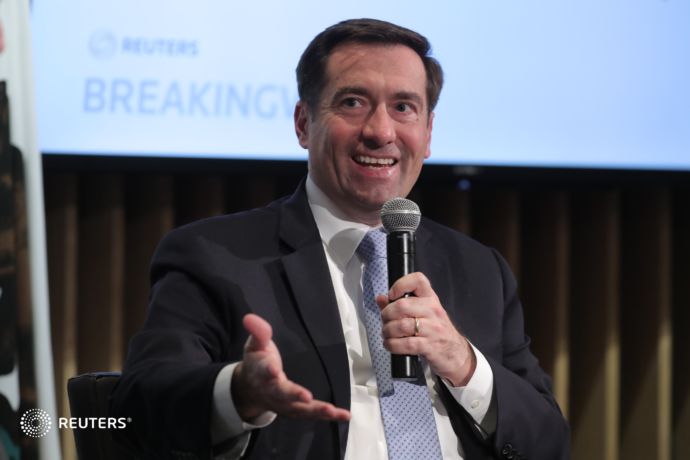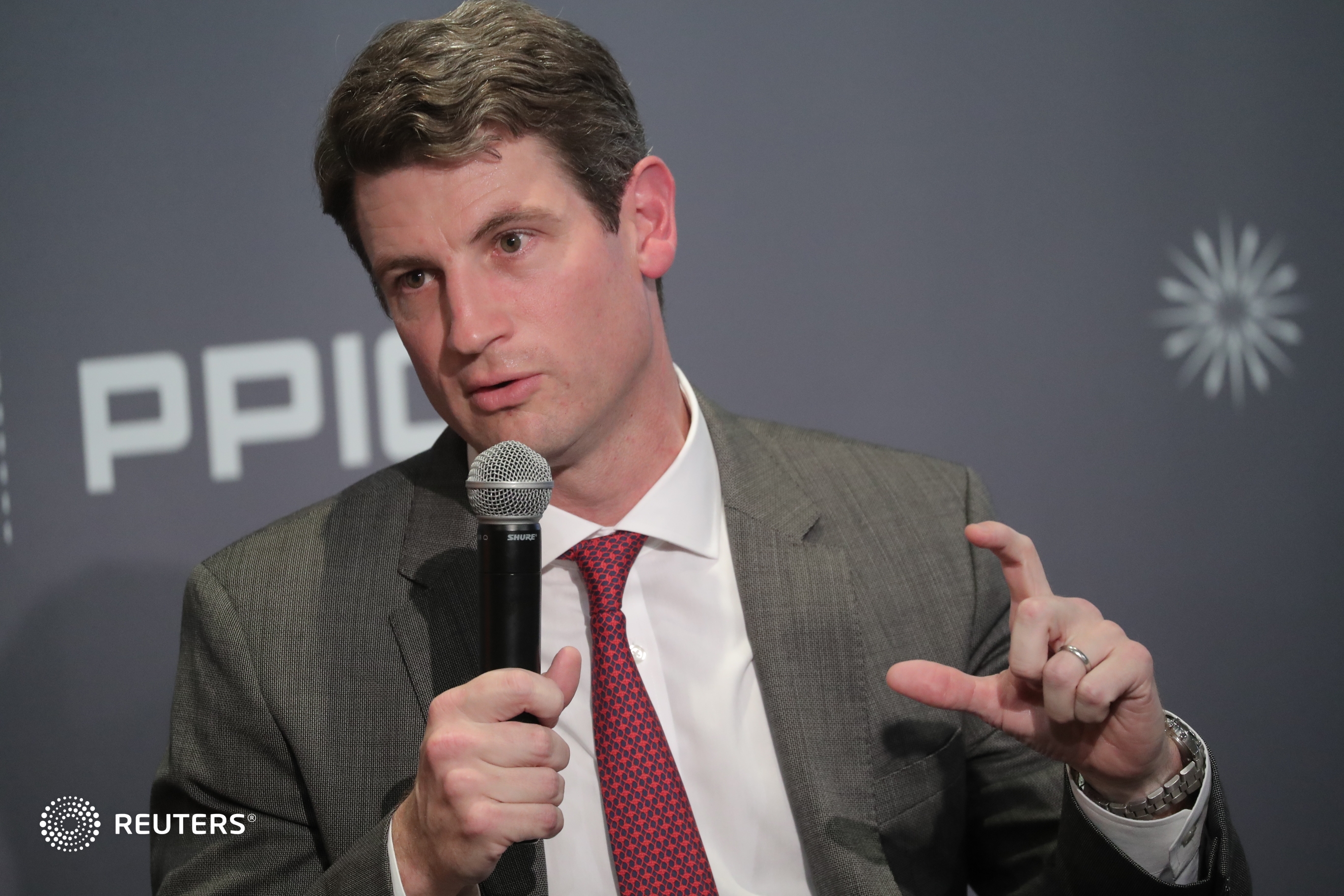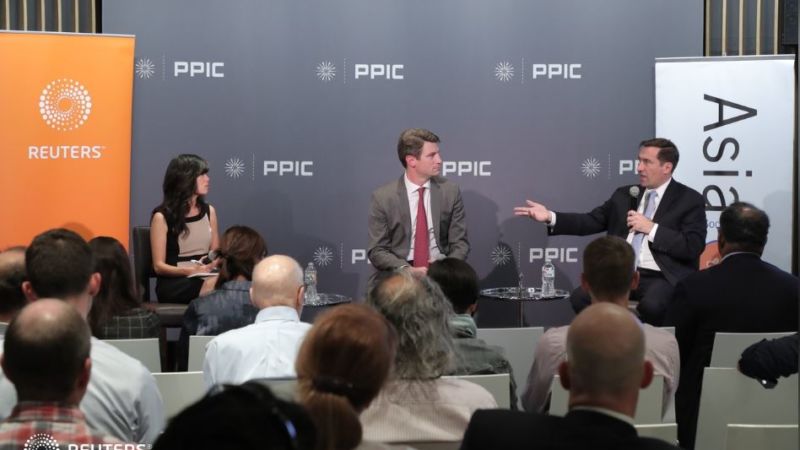Washington and Silicon Valley collided last week as John Demers, Assistant Attorney General for National Security, and Brent McIntosh, Under Secretary for International Affairs at the U.S Treasury, spoke with Gina Chon, Reuters Columnist at a Reuters Newsmaker event in San Francisco.
The question on everyone’s minds: Is China welcome to do business here? The answer was overwhelming “yes,” with common sense restrictions — don’t steal U.S. trade secrets, don’t commit cyber-espionage, and don’t break the law. Period. “The United States is still open for foreign investment and we want it to continue to be open,” McIntosh said. “We want to have predictability in the way we review transactions for the investor community.”
Demers explained that the U.S. will work with China in a way that mitigates the risks that
some Chinese criminal actors pose either to the schools or the companies they are joining. “Ultimately it would be self-defeating to close ourselves off to the world or to close ourselves off to China,” Demers said. “We need to find a way to continue to welcome — whether it’s Chinese students, Chinese folks who came here to work, or Chinese investment.”
The “China Initiative” as a continuing policy
The hallmark of the current administration’s trade policy with China is using tariffs as a punitive measure. Yet those tariffs have had adverse consequences in the U.S. and elsewhere, including raising prices for businesses, disrupting global supply chains, and creating crippling uncertainty for companies, which in turn often delay investment and hiring.
However, Chon asked, if the U.S. is “open for business,” as Demers and McIntosh stated, why do we have the so-called China Initiative, in the first place? The China Initiative was crafted to help investigate and prosecute Chinese companies aggressively for alleged trade secret theft, economic espionage, Foreign Corrupt Practices Act (FCPA) offenses, and other violations of U.S. law.
Is this approach unique to the current administration’s perceived policy pivot? Does it mean the U.S. is prioritizing and countering perceived national security threats from China? Doesn’t this send a mixed message to China and global business partners as we all work to create a more stable marketplace?

According to Demers, no. This is merely a continuation and expanding on the work of the Obama administration, starting with the first-ever prosecution of five Chinese military hackers for cyber-espionage against U.S. corporations and a labor organization in 2014. The emphasis on stopping Chinese cyber-intrusions is the result of years of investigative efforts, he explained. “An indictment of that nature is as much a geopolitical statement as it is a law enforcement statement, and we’re building on that work together with the U.S. Attorneys’ offices around the country.”
Indicting without a defendant: Is it worth the effort?
Chon also questioned the value of prosecuting cases where the chance of bringing the alleged criminal to court is slim. Demers explained that most of these cases the U.S. Department of Justice (DOJ) brings today do have a defendant in court, but there many reasons to bring a case, even if they will never get China to extradite the accused. These reasons include: i) to educate the public and demonstrate that U.S. prosecutors can attribute certain behavior not only to a country, but to a person; ii) to educate the business community about trending cyber-threats; and iii) to build international consensus around cyber-norms — namely, that we don’t tolerate cyber-intrusions to steal intellectual property as we saw in the 2014 case.
“The goal of the indictment is sending that message,” Demers said, adding that this is an important message and it’s not just about China. “There are other countries around the world that are watching, and if they think they can get away with it then they’ll think about it as a tool of economic development.”
What is the role of CFIUS?
Chon also asked if the Committee on Foreign Investment in the United States (CFIUS) is really in place just to block Chinese companies from buying things here? McIntosh said that was not the case, and that CFIUS enjoys overwhelming bi-partisan support.
“There are a lot of partisan issues in Washington but a robust and effective CFIUS process is not one of them,” McIntosh said. Yet, CFIUS is not China-specific, he added, and denied that Chinese investment was being singled out. Rather, because China is a larger country, there tends to be more activity in that space; but the Committee reviews a broad variety of industrial transactions to ensure an acquisition does not present a U.S. national security risk.

Demers added that in addition to monitoring transactions, the DOJ is also interested in acquisitions of sensitive personal data and that brings new proposed acquisitions under scrutiny that may not have been there before. “We’ve seen a lot of companies brought into the CFIUS process that weren’t really cutting-edge technology companies,” Demers said. “But what they have is a lot of data of their customers and that’s something that we look into. If that data is improperly used, it can be an intelligence weakness against us.”
McIntosh also spoke about the growing importance of recently passed legislation that fills in the gaps relating to foreign investment and national security risks. The Foreign Investment Risk Review Modernization Act of 2018 (FIRRMA) is a parcel of regulatory reform that covers, among other things, foreign transactions that would normally trigger a CFIUS process without resulting in majority control of the business, he said. Examples of minority control which may trigger the review process include personal data technologies and critical infrastructure; more importantly, it also expanded CFIUS to reach certain real estate transaction where the result is the ability to surveil U.S. military facilities.
Peering in the future: What can Chinese business expect?
Chon ended the interview by asking what people can expect to see from both the China Initiative and the CFIUS process, particularly around proposed regulations which would allow certain countries to be exempt from the FIRRMA process. McIntosh said that the reform legislation becomes effective next year; and the administration’s goal is to create a known quantity and set of rules for the investing community.
Demers also stated the future of the China Initiative will depend on future Chinese behavior. The ball is in their court, he said, and they should play by the global rules of fairness and trust.








